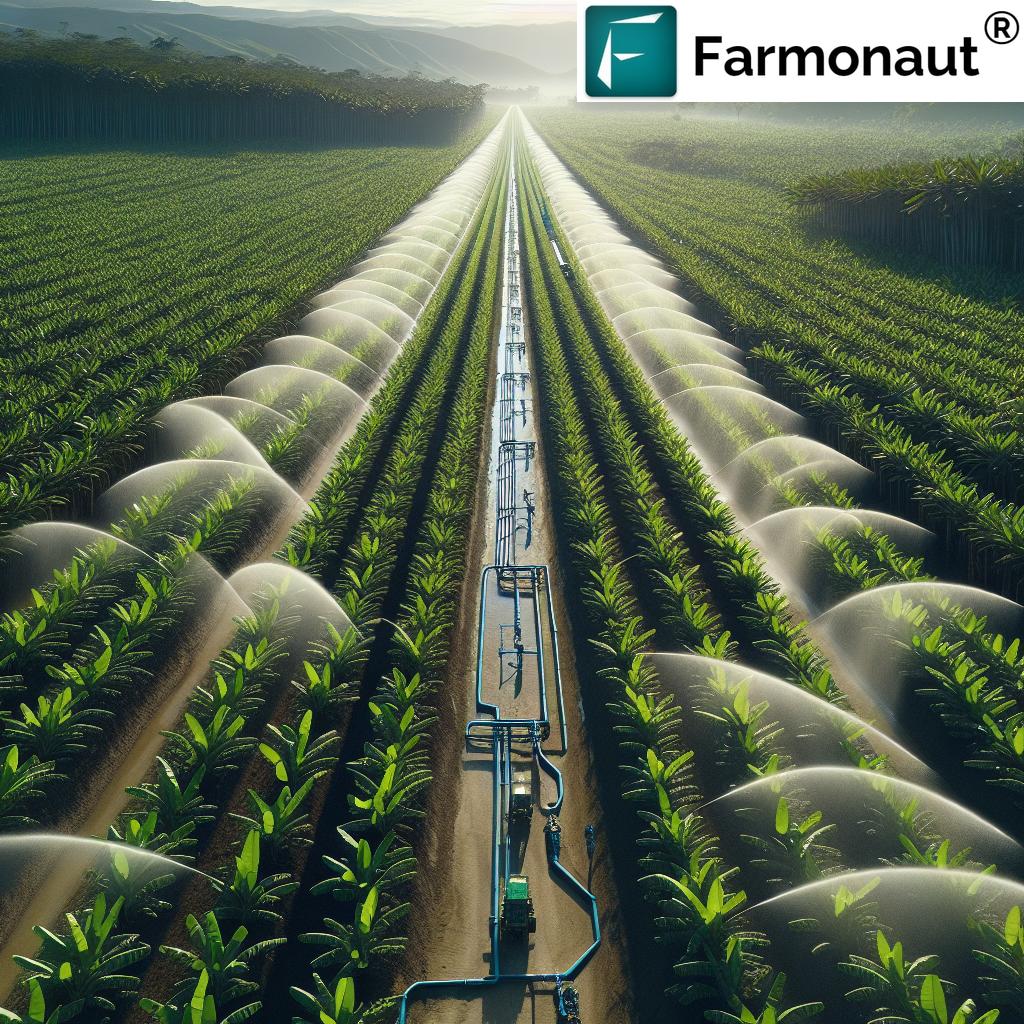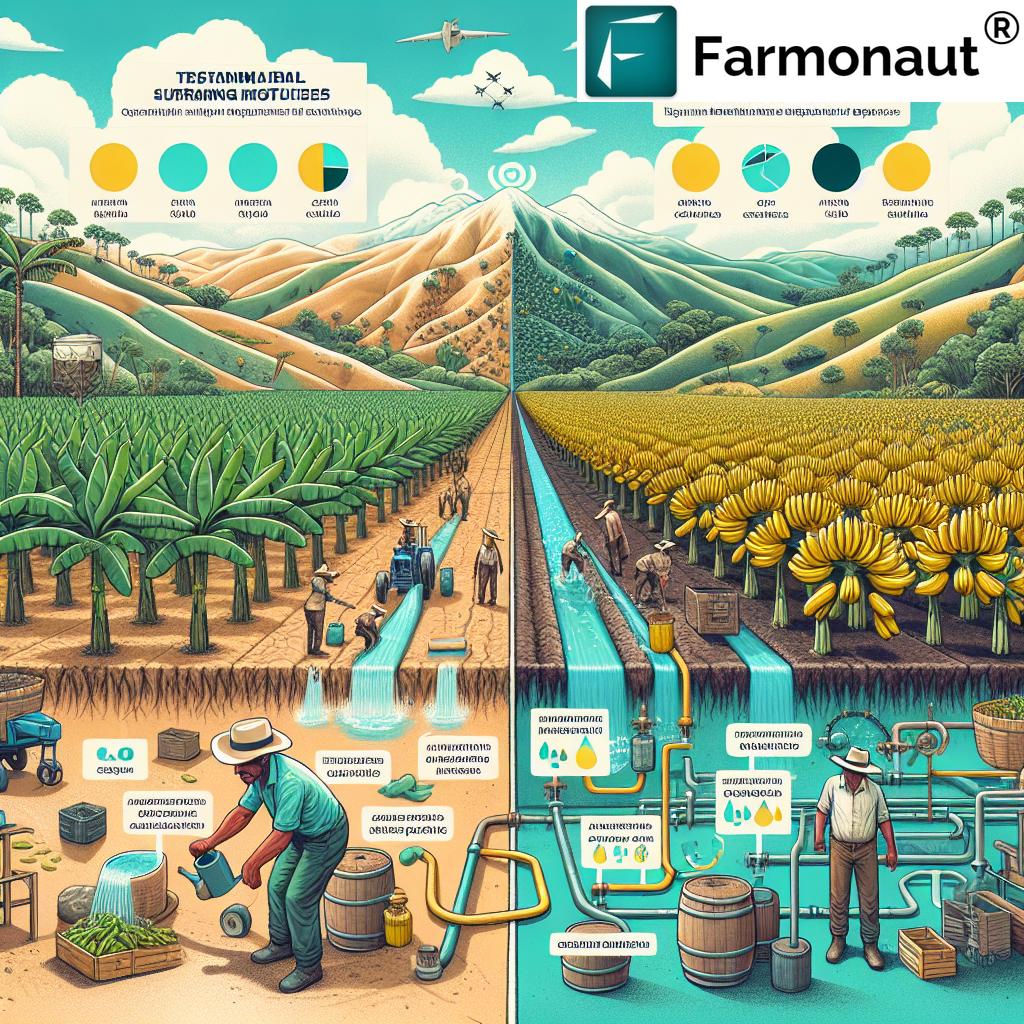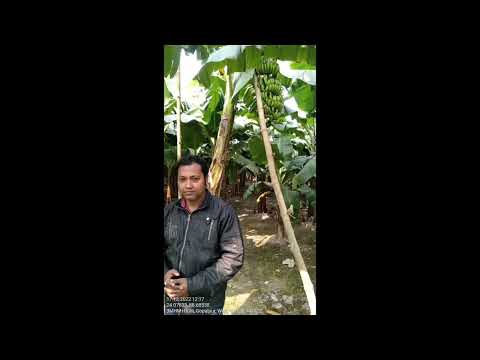Revolutionizing Colombian Banana Production: Sustainable Water Management Techniques for Magdalena’s Aquifers
“Colombia’s Magdalena region project targets two key basins: Rio Frio and Rio Sevilla, for sustainable banana production.”
In the heart of Colombia’s vibrant agricultural landscape, a groundbreaking project is taking shape that promises to transform the way we think about banana production and water management. As we delve into this innovative initiative, we’ll explore how sustainable practices are being implemented to address critical challenges faced by banana producers in the Magdalena region, particularly in the face of water scarcity and climate change.
Our journey through this revolutionary project will take us from the lush banana plantations of Colombia to the intricate world of aquifer storage and recovery techniques. We’ll uncover how these cutting-edge methods are not only enhancing crop yields but also preserving the delicate ecological balance of the surrounding areas.

The Magdalena Region: A Crucible of Agricultural Innovation
The Magdalena region, nestled in the northern part of Colombia, has long been a powerhouse of banana production. However, the area faces significant challenges, including:
- Water scarcity during dry seasons
- Inadequate irrigation systems
- The looming threat of climate change
These factors have pushed stakeholders to seek innovative solutions that can sustain and enhance banana production while conserving precious water resources. Enter the groundbreaking project that focuses on sustainable water management and banana production in this vital agricultural hub.
Aquifer Storage and Recovery: A Game-Changer for Agriculture
At the heart of this initiative lies the implementation of Aquifer Storage and Recovery (ASR) techniques. But what exactly is ASR, and how does it benefit banana production?
ASR is a water management technique that involves:
- Capturing excess water during rainy periods
- Storing this water in underground aquifers
- Recovering the stored water during dry seasons when it’s most needed
This ingenious system acts as a natural underground reservoir, providing a sustainable solution to water scarcity issues that have long plagued the region’s agricultural sector.
The Four-Phase Approach to Sustainable Banana Production
“The innovative water management project in Colombia’s banana sector is structured in four distinct phases for implementation.”
The project in Colombia’s Magdalena region is meticulously structured into four phases, each designed to address specific aspects of sustainable water management and banana production:
Phase 1: Feasibility Study and Stakeholder Engagement
In this crucial initial phase, we’re conducting comprehensive feasibility studies to assess the potential of ASR techniques in the Rio Frio and Rio Sevilla basins. This involves:
- Geological surveys to understand aquifer characteristics
- Hydrological assessments to map water flows
- Stakeholder meetings to gather local insights and secure buy-in
By engaging with local banana producers, environmental agencies, and community leaders, we’re ensuring that the project aligns with the needs and concerns of all stakeholders.
Phase 2: Technical Design and Planning
With the feasibility studies complete, our team of experts is now focused on designing the technical aspects of the ASR system. This includes:
- Developing detailed plans for water capture and storage infrastructure
- Creating models for optimal water recovery and distribution
- Integrating sustainable irrigation systems tailored for banana cultivation
The technical design phase is crucial for ensuring that the ASR system is not only effective but also environmentally sustainable and economically viable for local producers.
Phase 3: Pilot Implementation
The third phase involves the exciting step of implementing a pilot project. This will allow us to:
- Test the ASR system on a smaller scale
- Monitor its performance in real-world conditions
- Gather valuable data for fine-tuning and optimization
The pilot project will serve as a living laboratory, demonstrating the practical benefits of ASR to local stakeholders and providing crucial insights for the full-scale implementation.
Phase 4: Full-Scale Implementation and Monitoring
The final phase will see the roll-out of the ASR system across the targeted basins. This phase includes:
- Large-scale construction of water capture and storage facilities
- Implementation of advanced irrigation systems
- Continuous monitoring and evaluation of system performance
Throughout this phase, we’ll be closely tracking key performance indicators such as water usage efficiency, crop yields, and environmental impact to ensure the project’s success and sustainability.

Artificial Recharge: Boosting Aquifer Capacity
A key component of the ASR system in the Magdalena region is the use of artificial recharge methods. These techniques are designed to enhance the natural replenishment of aquifers, ensuring a sustainable water supply for banana production. Some of the artificial recharge methods being explored include:
- Infiltration basins: Shallow ponds that allow water to seep into the ground
- Injection wells: Deep wells used to pump water directly into aquifers
- Permeable pavements: Specially designed surfaces that allow rainwater to percolate into the ground
By implementing these methods, we’re not only increasing the water storage capacity of the aquifers but also improving water quality through natural filtration processes.
The Role of Technology in Sustainable Water Management
In today’s digital age, technology plays a crucial role in optimizing water management for agriculture. At Farmonaut, we’re at the forefront of this technological revolution, offering cutting-edge solutions that complement sustainable water management practices.
Our satellite-based crop health monitoring system provides real-time insights into vegetation health and soil moisture levels. This valuable data helps banana producers in the Magdalena region make informed decisions about irrigation, ensuring optimal water usage and crop yields.
Explore Farmonaut’s innovative solutions:
For developers and organizations looking to integrate our technology into their own systems, we offer a robust API:
The Impact on Banana Production and Export
Colombia is a major player in the global banana market, and the implementation of sustainable water management techniques is set to enhance its position further. Here’s how the project is expected to impact banana production and export:
- Increased crop yields: Reliable water supply and optimized irrigation lead to healthier plants and higher yields
- Improved fruit quality: Consistent water availability results in better-quality bananas, meeting international standards
- Enhanced export potential: Sustainable practices align with global demand for environmentally responsible produce
- Year-round production: ASR techniques help mitigate seasonal water scarcity, enabling more consistent production
By addressing water management challenges, the project not only secures the future of banana production in the Magdalena region but also strengthens Colombia’s position in the global agricultural market.
Environmental Benefits and Ecological Balance
The sustainable water management project in the Magdalena region isn’t just about improving banana production; it’s also about preserving the delicate ecological balance of the area. Some of the key environmental benefits include:
- Reduced pressure on surface water sources: By utilizing underground aquifers, the project helps preserve rivers and streams
- Prevention of saltwater intrusion: Proper aquifer management helps maintain freshwater levels, preventing seawater from contaminating coastal aquifers
- Habitat preservation: Sustainable water use means less strain on natural ecosystems, protecting local flora and fauna
- Climate change resilience: ASR systems provide a buffer against extreme weather events, helping to mitigate the impacts of climate change
These environmental benefits underscore the holistic approach of the project, demonstrating that agricultural productivity and ecological conservation can go hand in hand.
Cost-Benefit Analysis: The Economic Case for Sustainable Water Management
While the environmental and agricultural benefits of the project are clear, it’s equally important to consider its economic viability. Our comprehensive cost-benefit analysis reveals promising potential for implementing these techniques:
- Initial investment: While the upfront costs for ASR infrastructure are significant, they’re offset by long-term benefits
- Operational savings: Reduced water pumping costs and more efficient irrigation lead to lower operational expenses
- Increased revenue: Higher crop yields and improved fruit quality translate to better market prices and increased export opportunities
- Risk mitigation: The project provides a hedge against water scarcity, reducing the financial risks associated with crop failures
Our analysis indicates that the return on investment for banana producers adopting these sustainable water management techniques could be substantial, with payback periods varying depending on the scale of implementation.
Comparative Analysis of Water Management Techniques
To better understand the advantages of the innovative water management techniques being implemented in the Magdalena region, let’s compare them with traditional methods:
| Water Management Technique | Estimated Water Usage (m³/hectare/year) | Potential Crop Yield Increase (%) | Environmental Impact | Implementation Cost ($/hectare) | Long-term Sustainability Score (1-10) |
|---|---|---|---|---|---|
| Traditional Irrigation | 15,000 | Baseline | High | 1,000 | 3 |
| Aquifer Storage and Recovery | 10,000 | 20-30 | Low | 5,000 | 9 |
| Artificial Recharge Methods | 11,000 | 15-25 | Low | 3,500 | 8 |
| Sustainable Drainage Systems | 12,000 | 10-20 | Medium | 2,500 | 7 |
This comparison clearly illustrates the advantages of innovative water management techniques over traditional methods, particularly in terms of water usage efficiency, crop yield potential, and long-term sustainability.
Stakeholder Engagement and Participation
The success of this revolutionary project hinges on the active engagement and participation of various stakeholders. Throughout the project’s phases, we’re working closely with:
- Local banana producers: Ensuring their needs and concerns are addressed
- Environmental agencies: Collaborating to maintain ecological balance
- Government officials: Aligning the project with regional and national development goals
- Research institutions: Leveraging academic expertise for continuous improvement
- Community leaders: Fostering local support and understanding
By fostering a collaborative environment, we’re not only implementing sustainable water management techniques but also building a community of practice that can drive long-term agricultural innovation in the region.
Looking to the Future: Scalability and Replication
While the current project focuses on the Rio Frio and Rio Sevilla basins in the Magdalena region, its potential for scalability and replication is significant. The lessons learned and techniques developed here could be applied to:
- Other banana-producing regions in Colombia
- Different crops facing similar water management challenges
- Agricultural areas worldwide grappling with water scarcity
As we progress through the project phases, we’re documenting best practices and developing guidelines that can help other regions implement similar sustainable water management solutions.
The Role of Technology in Monitoring and Optimization
In the digital age, technology plays a crucial role in the success of sustainable water management projects. At Farmonaut, we’re proud to offer cutting-edge solutions that complement these initiatives:
- Satellite-based crop monitoring: Our advanced imagery provides real-time insights into crop health and water stress
- AI-driven advisory systems: Personalized recommendations help farmers optimize water usage and crop management
- Blockchain-based traceability: Ensuring transparency in sustainable banana production from farm to consumer
These technological tools not only enhance the effectiveness of water management techniques but also provide valuable data for continuous improvement and decision-making.
Conclusion: A Sustainable Future for Colombian Banana Production
As we conclude our exploration of this groundbreaking project, it’s clear that the implementation of sustainable water management techniques in Colombia’s Magdalena region represents a significant leap forward for banana production. By addressing critical challenges such as water scarcity and climate change impacts, this initiative not only secures the future of a vital agricultural sector but also sets a new standard for sustainable farming practices worldwide.
The four-phase approach, from feasibility studies to full-scale implementation, ensures a thorough and well-planned execution. The integration of innovative technologies like Aquifer Storage and Recovery (ASR) and artificial recharge methods promises to revolutionize how we manage water resources in agriculture.
Moreover, the project’s holistic approach, considering environmental preservation, economic viability, and stakeholder engagement, serves as a model for sustainable agricultural development. As we look to the future, the potential for scalability and replication offers hope for addressing similar challenges in other regions and crops.
At Farmonaut, we’re excited to be part of this agricultural revolution, providing technological solutions that complement and enhance sustainable farming practices. Together, we’re not just growing bananas; we’re cultivating a more sustainable and resilient future for agriculture.
FAQs
- What is Aquifer Storage and Recovery (ASR)?
ASR is a water management technique that involves capturing excess water during rainy periods, storing it in underground aquifers, and recovering it during dry seasons when it’s most needed. - How does this project benefit banana producers in Colombia?
The project ensures a more reliable water supply, leading to increased crop yields, improved fruit quality, and enhanced export potential. It also helps producers adapt to climate change challenges. - What are the environmental benefits of this sustainable water management project?
The project reduces pressure on surface water sources, prevents saltwater intrusion in coastal areas, preserves natural habitats, and enhances overall ecological balance. - How long will it take to see results from this project?
While some benefits may be observed during the pilot phase, full-scale implementation and long-term results are expected to be evident over the course of several growing seasons. - Can these techniques be applied to other crops or regions?
Yes, the principles and techniques developed in this project have the potential to be adapted and applied to other crops facing water management challenges, as well as different geographical regions worldwide.
Subscription Plans






